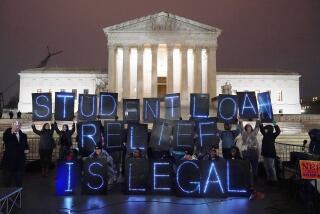Judge Scraps Microsoft School Deal
Microsoft Corp.’s $1-billion plan to settle more than 100 consumer antitrust lawsuits was rejected Friday by a federal judge, who said the software giant wasn’t offering enough money.
In a rare move, U.S. District Judge Frederick Motz refused to give preliminary approval to the deal hammered out between Microsoft and a consortium of class-action lawyers from several states.
Instead of reimbursing customers for overpayments because of Microsoft’s ill-gotten monopoly, the deal would have given money, software, computers and training to schools with poor students.
The ruling leaves open the possibility of new negotiations among all the parties because it suggests that more money and a greater percentage of cash in the grants could do the job.
Microsoft deputy general counsel Tom Burt said the company was disappointed by the ruling but has no plans to appeal.
“Whether or not there will be further negotiations remains to be seen,” he said.
Deal opponent Eugene Crew, the lead attorney in 20 California class-action suits, said he was looking forward to trial.
“I invite them to give us a call, but we have an August trial date,” Crew said. “We want to go to trial and get in front of a jury.”
Motz agreed that the school donation concept was a reasonable one, given the administrative costs of distributing small refunds or coupons to 100 million plaintiffs subject to various state laws.
But he wrote that the education foundation Microsoft hoped to establish would be “critically underfunded” and might unfairly extend Microsoft’s market dominance.
Motz’s other problems with the settlement included the wide range of estimates of how much Microsoft’s customers could hope to recover at trial--from nothing to more than $40 billion.
And he said that although the foundation would sponsor the purchase of Apple Computer Inc. products as well as Microsoft’s, the prices involved, the nature of most refurbished machines for sale and other factors probably would steer schools toward more Microsoft gear.
“It appears to provide a means for flooding a part of the kindergarten-through-high-school market, in which Microsoft has not traditionally been the strongest player,” Motz wrote.
Apple and attorneys for California consumers were among those fighting the settlement, and Motz’s ruling came after renewed discussions with Crew failed to make much headway. Some state attorneys general, including California’s, also objected.
Crew said that a much bigger education-oriented settlement might work, but that he had proposed a deal that would offer money to as many as 13 million California consumers, who could then decide whether they wanted to make donations.
The class-action attorneys who had worked on the settlement couldn’t be reached for comment.
Rob Enderle, an analyst with Giga Information Group, said Microsoft will try again to settle the case.
“It depends on what California wants,” he said. “With the judge voicing his opinion, it’s probably going to be a lot more money.”
Others agreed that it makes sense for Microsoft to keep at it, now that Motz has validated the approach.
“It’s certainly to Microsoft’s advantage to try to work out a settlement,” said Gartner Group analyst Michael Silver. “Microsoft would like to settle all of this stuff and get it out of the way.”
Microsoft’s Burt said the company may try to follow Motz’s suggestions for improving the settlement.
“Microsoft is always open to looking for reasonable ways to resolve litigation,” Burt said. “We will review the court’s opinion and at the same time move forward with the next steps in the litigation.”
Microsoft investors, who had hoped the settlement would end one of the company’s thorniest legal problems, sent shares of the company down 67 cents to $68.61 in Nasdaq trading Friday.
The company also is fighting nine states that broke with the Justice Department and declined to join an antitrust settlement between authorities and the company. The states are seeking harsher penalties than the federal government, including a requirement that the company offer versions of Windows without such add-ons as its instant-messaging service and its music and video player.






